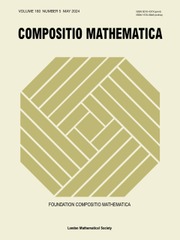Equivariant Cohomology in Algebraic Geometry
Equivariant cohomology has become an indispensable tool in algebraic geometry and in related areas including representation theory, combinatorial and enumerative geometry, and algebraic combinatorics. This text introduces the main ideas of the subject for first- or second-year graduate students in mathematics, as well as researchers working in algebraic geometry or combinatorics. The first six chapters cover the basics: definitions via finite-dimensional approximation spaces, computations in projective space, and the localization theorem. The rest of the text focuses on examples – toric varieties, Grassmannians, and homogeneous spaces – along with applications to Schubert calculus and degeneracy loci. Prerequisites are kept to a minimum, so that one-semester graduate-level courses in algebraic geometry and topology should be sufficient preparation. Featuring numerous exercises, examples, and material that has not previously appeared in textbook form, this book will be a must-have reference and resource for both students and researchers for years to come.
- Features many varied examples to give instructors choice, and allows for diverse backgrounds of students, including those interested in combinatorics and topology, as well as algebraic geometry
- Focuses on elementary and algebraic techniques to introduce a new audience to a traditionally topological subject
- Some material appears for the first time in textbook form, such as proofs of the localization and GKM theorems, formulas for degeneracy loci, and recent developments in Schubert calculus
Reviews & endorsements
‘This book is a much-needed introduction to a powerful and central tool in algebraic geometry and related subjects. The authors are masters of clarity and rigor. The important theorems and examples are thoroughly explained, and illuminated with well-chosen exercises. This book is an essential companion for anyone wanting to understand group actions in algebraic geometry.’ Ravi Vakil, Stanford University
‘Equivariant Cohomology is a tool from algebraic topology that becomes available when groups act on spaces. In Algebraic geometry, the groups are algebraic groups, including tori, and typical spaces are toric varieties and homogeneous varieties such as Grassmannians and flag varieties. This book introduces and studies equivariant cohomology (actually equivariant Chow groups) from the perspective of algebraic geometry, beginning with the artful replacement of Borel's classifying spaces by Totaro's finite-dimensional approximations. After developing the main properties of equivariant Chow groups, including localization and GKM theory, the authors investigate equivariant Chow groups of toric varieties and flag varieties, and the equivariant classes of Schubert varieties. Reflecting the interests of the authors, special attention is paid to Schubert calculus and the links between degeneracy loci and equivariant cohomology. The text also serves as an introduction to flag varieties, their Schubert varieties, and the calculus of Schubert classes in equivariant cohomology.’ Frank Sottile, Texas A&M University
‘Equivariant Cohomology in Algebraic Geometry by David Anderson and William Fulton offers a comprehensive, accessible exploration of the development, standard examples, and recent contributions in this fascinating field. The authors have successfully struck a balance between rigor and approachability, making it an excellent resource for young researchers in the field. The book's real strength lies in its application to toric varieties and Schubert varieties across various settings, including Grassmannians, flag varieties, degeneracy loci, and extensions to other classical types and Kac–Moody groups. The authors' treatment of Bott-Samelson desingularizations of Schubert varieties is particularly noteworthy, displaying elegance and coherence within the context of the book's material. With over 450 pages of content, Equivariant Cohomology in Algebraic Geometry offers a comprehensive resource for researchers and scholars. It is poised to become a standard reference in the field, leaving a lasting impact on the flourishing area of research for years to come.’ Sara Billey, University of Washington
Product details
October 2023Adobe eBook Reader
9781009349963
0 pages
This ISBN is for an eBook version which is distributed on our behalf by a third party.
Table of Contents
- 1. Preview
- 2. Defining equivariant cohomology
- 3. Basic properties
- 4. Grassmannians and flag varieties
- 5. Localization I
- 6. Conics
- 7. Localization II
- 8. Toric varieties
- 9. Schubert calculus on Grassmannians
- 10. Flag varieties and Schubert polynomials
- 11. Degeneracy loci
- 12. Infinite-dimensional flag varieties
- 13. Symplectic flag varieties
- 14. Symplectic Schubert polynomials
- 15. Homogeneous varieties
- 16. The algebra of divided difference operators
- 17. Equivariant homology
- 18. Bott–_Samelson varieties and Schubert varieties
- 19. Structure constants
- A. Algebraic topology
- B. Specialization in equivariant Borel–_Moore homology
- C. Pfaffians and Q-polynomials
- D. Conventions for Schubert varieties
- E. Characteristic classes and equivariant cohomology
- References
- Notation index
- Subject index.








